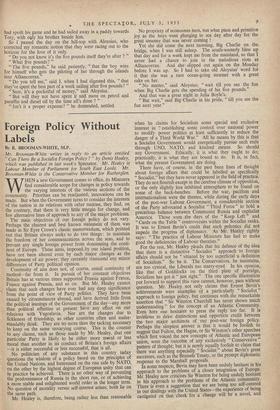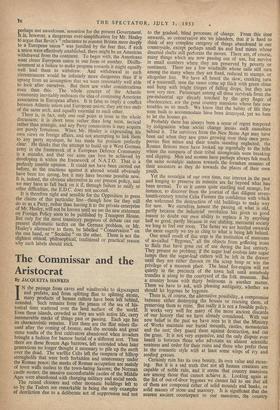Foreign Policy Without Labels
By R. BROOMAN-WHITE, M.P.
Mr. Brooman-White writes in reply to an article entitled Can There Be a Socialist Foreign Policy ? " by Denis Healey, which was published in last week's Spectator. Mr. Healey is Labour Member of Parliament for South East Leeds. Mr. Brooman-White is the Conservative Member for Rutherglen.
WHEN a new Government comes to office, its Ministers find considerable scope for changes in policy towards the varying interests of the various sections of the community. Priorities can be readjusted; innovations can be made. But when the Government turns to consider the interests of the nation in its relations with other nations, they find, on the contrary, that there is very little margin for change, and few alternative lines of approach to any of the major problems.
The main objectives of our foreign policy do not vary. Perhaps the clearest and best known statement of them was made in Sir Eyre Crowe's classic memorandum, which pointed out that, Britain always seeks to do two things : to maintain the freedom of her communications across the seas, and to prevent any single foreign power from dominating the conti- nent of Europe. These aims, imposed by our island position, have not been altered even by such major changes as the development of air power; they certainly transcend any minor differences of Party political opinion. Continuity of aim does not, of course, entail continuity of method—far from it. In pursuit of her constant objectives Britain has at various times supported Prussia against France, France against Prussia, and so on. But Mr. Healey cannot claim that such changes have ever had any deep significance from the point of view of Party politics. They have been caused by circumstances abroad, and have derived little from the political leanings of the Government of the day—any more than political affinities at present have any effect on our relations with Yugoslavia. Nor are the changes due to fickleness of friendship, as other countries often and under- standably think. They are no more than the tacking necessary to. keep on the same unvarying course. This is the counter to any claims, such as those made by Mr. Healey, that one particular Party is likely to be either more moral or less moral than another in its conduct of Britain's foreign affairs —it is either successful or less successful, that is all. No politician of any substance in this country today questions the wisdom of a policy based on the principles of the United Nations, and buttressed on the one side by NATO, on the other by the highest degree of European unity that can in practice be achieved. There is no other way of preventing the predominance of Russia in the short run, or of achieving a more stable and enlightened world order in the longer term. No question of morality versus self-interest arises; both lie on the same path. Mr. Healey is, therefore, being rather less than reasonable when he claims for Scicialisin some special and exclusive interest in `.` establishing some control over national power to modify power politics at least sufficiently to reduce the danger of a Third World War." All he means by this is that a Socialist Government would energetically pursue such ends through UNO, NATO, and kindred means. So should any Government. Ethically, it is what they ought to do; practically, it is what they are bound to do. It is, in fact, what the present Government are doing.
There have, of course, in the past been lines of thought about foreign affairs that could be labelled as specifically " Socialist," but they have never appeared in the field of practice. They do not flourish except in the carefree climate of opposition, or the only slightly less inhibited atmosphere to be found on some of the back-benches. Before the war, pacifism and internationalism were the themes, while during the early days of the post-war Labour Government, a considerable section of the Party advocated a Socialist " Third Force " to hold a precarious balance between Communist Russia and capitalist America. Those were the days of the " Keep Left ' and " Cards on the Table " controversies within the Socialist ranks. It was to Ernest Bevin's credit that such polemics did not impede the progress of diplomacy. As Mr. Healey rightly says : " The practice of Labour Ministers has had to make good the deficiencies of Labour theorists."
For the rest, Mr. Healey pleads that his defence of the idea that there is a distinctive Socialist " approach to foreign affairs should not be " vitiated by too superficial -a definition of Socialism." So be it. The Conservatives, he maintains, are too cynical, the Liberals too starry-eyed. In his opinion, like that of Goldilocks on the third plate of porridge, Socialism has got it " just right." The one specific illustration put forward to support this view cannot, however, pass without question. Mr. Healey not only claims that Ernest Bevin's achievements were examples of a particularly " Socialist " approach to foreign policy, but continues with-the remarkable assertion that " Sir Winston Churchill has never shown much understanding " for the concept of an Atlantic Community. Even here one hesitates to press the reply too far. It is invidious to draw distinctions and opportion credit between the two major architects of our post-war foreign policy. Perhaps the simplest answer is that it would be foolish to suggest that Fulton, the Hague, or Sir Winston's other speeches which first voiced the new concepts of Atlantic and European- union, were the outcome of any exclusively " Conservative " 'pattern of thought; but it is surely equally foolish to claim that there was anything especially " Socialist " about Bevin's great successes, such as the Brussels Treaty, or the prompt diplomatic response to the Marshall proposals. In some respects, Bevin may have been unduly hesitant in his approach to the problems of a closer integration of Europe. Mr. Healey now criticises Sir Winston for being unduly hesitant in his approach to the problems of the Atlantic community. There is even a suggestion that we are being too self-centred in our dealings with the United States—the experience of being castigated on that cheek for a change will be a novel, and perhaps not unwelcome, sensation for the present Government. It is, however, a dangerous over-simplification for Mr. Healey to argue that Bevin's " reluctance to commit Britain more deeply to a European union " was justified by the fear that, if such a union were effectively established, there might be an American withdrawal from the continent. To begin with, the Americans want closer European union in one form or another. Disillu- sionment at a failure to make progress towards it might equally well lead them to withdraw. And withdrawal in such circumstances would be infinitely more dangerous than if it sprang from an assumption that we were reasonably well able to look after ourselves. But there are wider considerations even than this. The whole concept of the Atlantic community inevitably embraces the idea of continuing American association in European affairs. It is false to imply a conflict between Atlantic union and European union; they are two ends of the same arch, and equally essential to each other.
There is, in fact, only one real point at issue in the whole discussion; it is short term rather than long term, tactical rather than strategic, and any Party connections it may acquire are purely fortuitous. When Mr. Healey is expounding his own views on foreign affairs, and not attempting to link them to any party mystique, he has made his position perfectly clear. He thinks that the attempt to build up a West German army in the framework of a European Defence Community is a mistake, and that our aims can best be achieved by developing it within the framework of N.A.T.O. That is a perfectly tenable opinion. It could not have been carried out before, as the reactions against it abroad would obviously have been too strong, but it may have become possible now. It is, indeed, the obvious alternative to our present policy, and we may have to fall back on it if, through failure to ratify or other difficulties, the E.D.C. does not succeed.
It is therefore right and sensible for the Opposition to press the claims of this particular line—though how far they will do so as a Party, rather than leaving it to the private enterprise of Mr. Healey, will not be known until we see the new statement on Foreign Policy soon to be published by Transport House. But only for the most transitory purposes of debate can our present diplomatic tactics on the German problem, or Mr. Healey's alternative to them, be labelled " Conservative " on the one hand, or " Socialist " on the other. There is not the slightest ethical, philosophical, traditional or practical reason why such labels should stick.



























































 Previous page
Previous page